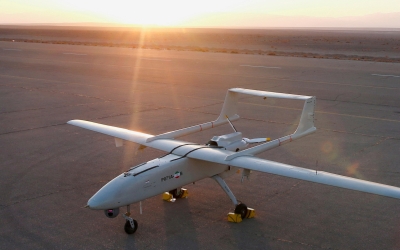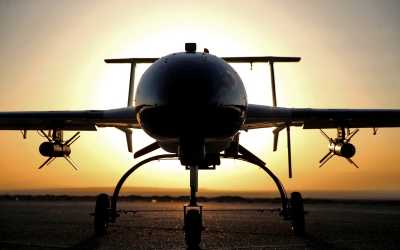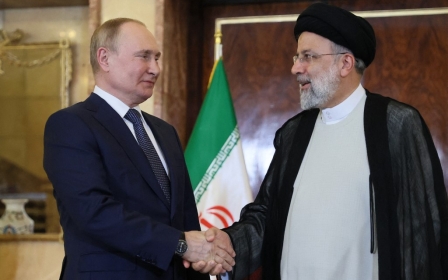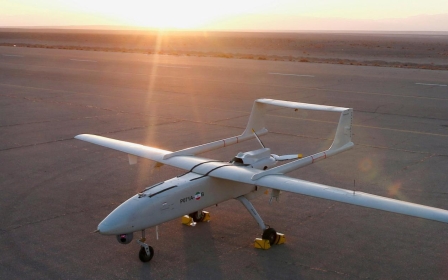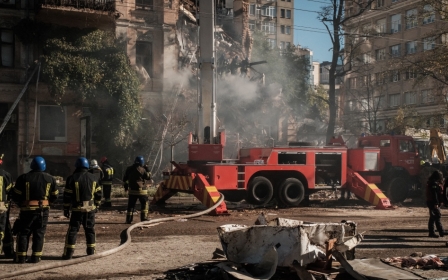Ukraine war: Iranian drone factory could open in Russia, but mutual suspicions remain
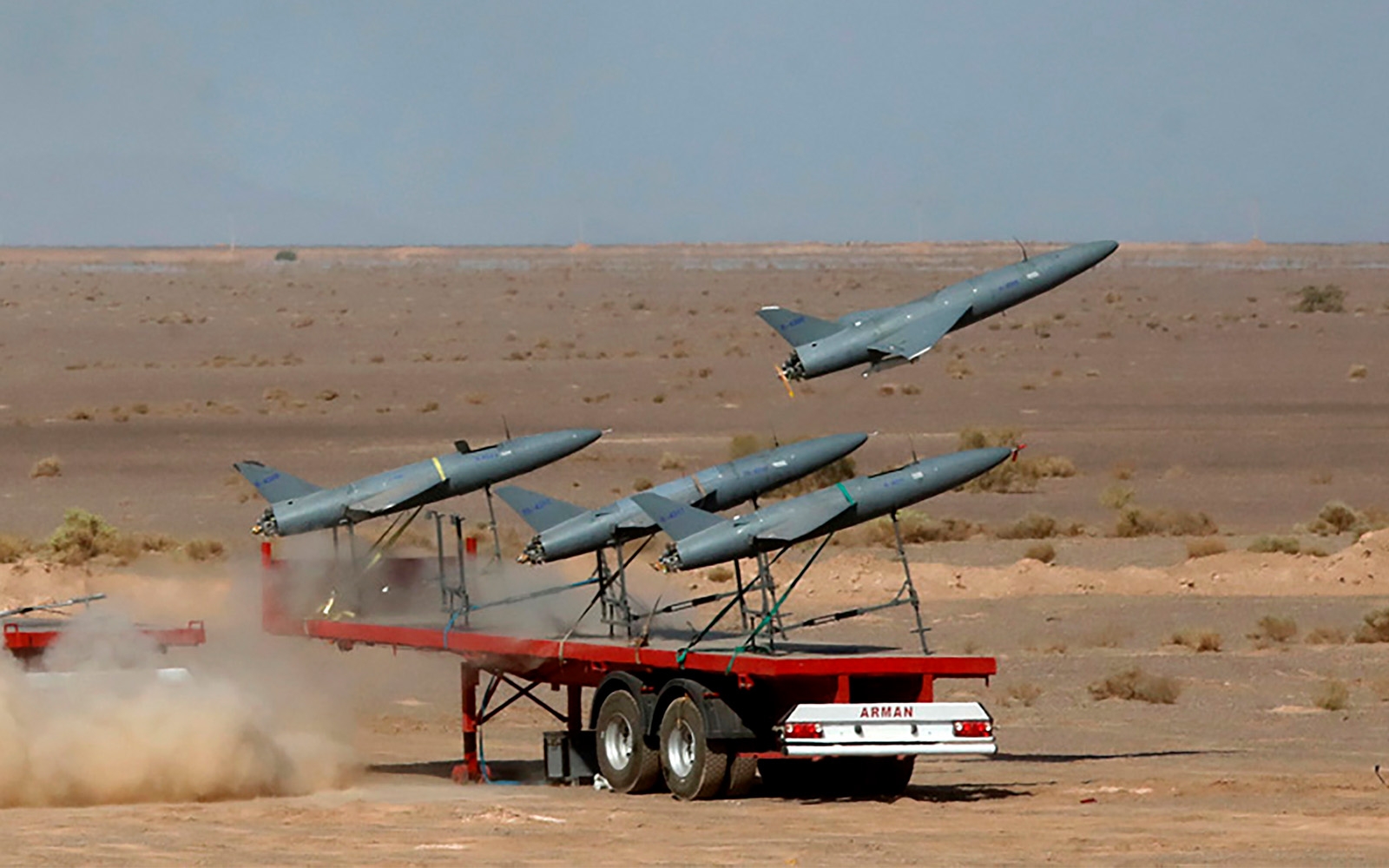
Iran and Russia have reportedly reached a deal that would see Tehran begin to manufacture its drones in Russia in the coming months, a move that indicates increasingly interlocking interests, despite mutual mistrust.
The agreement, first reported by the Washington Post as taking place in early November, would see the two countries consolidate their relationship as Russia desperately seeks to replenish its weapons stockpiles during its ongoing war in Ukraine.
If the deal is fully implemented, the Iranian drone factory would be only the second of its kind built outside of the country. The first, in the Central Asian state of Tajikistan, opened earlier this year.
'The two countries, despite their deepening partnership this year, continue to harbour suspicions of the other'
- Giorgio Cafiero, CEO of Gulf State Analytics
The two countries are now reportedly moving quickly to transfer the production line of Iranian drones to Russia, in a move that could dramatically scale up the number of drones produced and deployed in Ukraine.
New MEE newsletter: Jerusalem Dispatch
Sign up to get the latest insights and analysis on Israel-Palestine, alongside Turkey Unpacked and other MEE newsletters
Iranian-made drones have reportedly already been deployed in significant numbers in the Ukrainian theatre, destroying power plants and civilian and military infrastructure.
Reports suggest that Russia has bought several hundred Iranian drones, with another 1,000 ordered.
More significantly, the reported agreement, which has not been officially confirmed by either Iran or Russia, would deepen the strategic cooperation between the two and form part of a broader realignment in Asia.
For Tehran, the deal with Russia is part of its greater regional power projection, says Giorgio Cafiero, the CEO of Gulf State Analytics, a Washington-based political risk consultancy.
Israel, Turkey and the United Arab Emirates have all been developing their drone industry in recent years, with various levels of success.
It is also within this context that the Iranian-Russian military cooperation should be looked at.
Shared anti-western vision
"Iran is using the situation in Ukraine to send a message to its regional rivals, including some of the Gulf states and Israel, about the effectiveness of Tehran's drone capabilities," Cafiero told Middle East Eye.
"The Iranians are trying to make it clear that the country's drone technology has advanced significantly in recent years," and therefore is coveted by other countries, Cafiero added.
The deepening of relations with Russia is also not happening in a vacuum of Iranian foreign policy.
"The prospects for the JCPOA Iran nuclear deal are further dimming, and Iran is continuing its foreign policy orientation of looking east towards China, Central Asian countries, and of course Russia," said Cafiero.
Both sides increasingly need to show that they can break out of their international isolation by striking such deals, but this ultimately is a "marriage of convenience", the analyst said.
There is not necessarily any love lost between Iran and Russia "the two countries, despite their deepening partnership this year, continue to harbour suspicions of the other," he added.
One theatre where the relationship between Tehran and Moscow is regularly tested is Syria. Russia has de facto controlled the Syrian airspace since 2015, when it entered the Syrian civil war at the invitation of the country's President Bashar al-Assad.
Israeli attacks in Syria over the years, often hitting Iranian targets, happen with Russian acquiescence.
Earlier this month, even as Iran and Russia were signing an apparent deal on a drone factory, Israeli jets were busy firing missiles at Iranian interests.
"When it comes to Israeli military strikes against Iranian targets and interests in Syria, this is an issue that contributes to the lack of trust that Tehran has towards Moscow," said Cafiero.
"In Syria, the Russians and the Israelis have coordinated together a lot over the years. Iran knows that Russia totally permits Israel to strike against Iranian targets and interests in Syria, and Tehran has been disappointed by Russia's refusal to do more to prevent Israel from carrying out its military operations in Syria," he said.
For now, however, the geopolitical conflict with the West has papered over some of these broader concerns.
Economic interests
According to Hamidreza Azizi, an expert on Iran at the German Institute for International and Security Affairs (SWP), Russian and Iranian policymakers could have also decided to place the Iranian drone factory in Russia to give Tehran a degree of deniability about the sale of future drones - which have become controversial not just in the West but also within Iran.
If the reports of an Iranian drone factory in Russia are correct, Azizi believes that "economic considerations are not a priority here. It would be a rather strategic move by Iran," said Azizi, speaking to MEE.
While Iran's deal with Tajikistan was an important one, making one with Moscow is much more significant, as "Russia is still a great power", added Azizi.
While Moscow has cooperated with Iran in the past, where their interests aligned - particularly in reducing the US footprint in the Middle East - it's the war in Ukraine that seems to be the beginning of a new chapter.
Presidents Vladimir Putin and Ebrahim Raisi have spoken several times over the phone. The Russian leader even visited Tehran in July 2022. Whereas prior to the war, Russia may have taken advantage of Iran's international isolation, Moscow's military failures in Ukraine have rebalanced that relationship.
'Iran is still hopeful of getting something in return: either Russian advanced fighter jets or having Russian support in international organisations like the IAEA or the UN'
- Hamidreza Azizi, Iran expert
"The very nature of such a deal works as a signal to the world - despite the sanctions and the constraints, Iran has been able to develop its drone programme," said Azizi.
The deal also means the partnership between Tehran and Moscow is growing at an "unprecedented manner", added Azizi.
Iran has agreed to provide its most sophisticated drones to Russia, the Shahed-129, Shahed-191, and Mohajer-6, but "delivering weapons to Russia is one thing; establishing a factory and a production line of Iranian drones is a totally different thing," said Azizi.
What this means is that the cooperation between the two countries is being established for the long term and on a more strategic footing.
"Iran is still hopeful of getting something in return: either Russian advanced fighter jets, or having Russian support in international organisations like the International Atomic Energy Agency or the UN," added Azizi.
Given that Russia has previously voted against Iran in these institutions, that's likely to come as a relief to Tehran.
"The Russians are in the process of overhauling their foreign relations," said Azizi, and Moscow's growing partnership with Iran is likely to also provide a template for other countries in need of Russia's veto powers at the UN.
Iranian opposition
What Iranian actions internationally don't reveal is that, domestically, there is a lively debate about the exact nature of the relationship being formed with Russia.
"Predictably, some in the reformist camp have blasted the move," Sajjad Safaei, a post-doctoral researcher on Iran and the Middle East at Germany's Max Planck Institute, told MEE.
Former conservative members of parliament have also spoken out against Iran's position on the Ukraine war, Safaei added, accusing the country's leadership of being "played" by Russia.
Veteran Iranian diplomats, in a joint statement earlier this month, also warned against the "dangerous game" that Tehran is playing. However, according to Safaei "it's difficult to see how these voices can make a significant impact on Iran's Russia policy".
Arming Russia has "cost Iran greatly", said Safaei, noting that Tehran has traditionally had a cordial relationship with Kyiv - one which have been greatly damaged. And the West now sees Iran as one of the few, if not only, countries providing direct military assistance to Russia in Ukraine.
"Listening to western leaders speaking about Iran's drones, one gets the odd impression that Iran and Russia are equally culpable in this criminal war. And yet Iran may be an enabler, though most certainly not an initiator," said Safaei.
The cost of the Iranian relationship with Russia could take time to unfold. However, Safaei warns that a sign of what is to come may be emerging.
Russia's deployment of Iranian drones is likely to make it harder for Tehran to evade western sanctions.
"According to reports, analysis of drone wreckage has already revealed that at least 76 parts were sourced from 14 American companies. One can only imagine that acquiring those parts while under sanctions likely required painstaking effort," Safaei said.
"And now, because of Russia's deployment of a strategic weapon that has become central to Iran's defence doctrine in recent years, the United States and its allies may find it easier to block Iran's hitherto secret pathways to acquiring weapons parts," he added.
Middle East Eye delivers independent and unrivalled coverage and analysis of the Middle East, North Africa and beyond. To learn more about republishing this content and the associated fees, please fill out this form. More about MEE can be found here.


